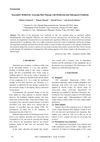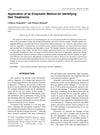 90 citations,
January 1979 in “International review of cytology”
90 citations,
January 1979 in “International review of cytology” Wool follicles are complex, involving interactions between different cell types and structures.
 47 citations,
January 2013 in “Indian Journal of Dermatology, Venereology and Leprology”
47 citations,
January 2013 in “Indian Journal of Dermatology, Venereology and Leprology” Premature graying of hair may suggest health issues and currently lacks effective treatments.
 43 citations,
July 2012 in “Molecular human reproduction”
43 citations,
July 2012 in “Molecular human reproduction” Certain metabolites are lower in women with PCOS and could be potential markers for the condition.
 30 citations,
October 2020 in “Nature Communications”
30 citations,
October 2020 in “Nature Communications” Finasteride irreversibly affects human steroid 5α-reductase 2, providing insight into its catalytic mechanism and disease-related mutations.
 28 citations,
April 1996 in “Cell biology international”
28 citations,
April 1996 in “Cell biology international” Changes in keratin affect skin health and can lead to skin disorders like blistering diseases and psoriasis.
 13 citations,
January 2016 in “Journal of cosmetology & trichology”
13 citations,
January 2016 in “Journal of cosmetology & trichology” Alternative treatments show promise for hair growth beyond traditional methods.
 10 citations,
October 2010 in “Hepatology”
10 citations,
October 2010 in “Hepatology” Certain liver diseases respond well to specific treatments and have varying risks for liver cancer.
 9 citations,
October 2011 in “Journal of proteomics”
9 citations,
October 2011 in “Journal of proteomics” Taxol damages hair growth cells, causing hair loss.
 9 citations,
January 1981 in “Australian journal of biological sciences”
9 citations,
January 1981 in “Australian journal of biological sciences” Lambs fed a liquid diet showed abnormal wool and skin, which improved with more B-vitamins, suggesting a link to B-vitamin deficiency.
 9 citations,
January 1959 in “The journal of nutrition/The Journal of nutrition”
9 citations,
January 1959 in “The journal of nutrition/The Journal of nutrition” Higher potassium intake may protect against hair loss and liver fat in lysine-deficient rats.
 5 citations,
December 1942 in “Journal of the American Medical Association”
5 citations,
December 1942 in “Journal of the American Medical Association” Choline and biotin are important for liver health and preventing certain deficiencies in animals, and more research is needed to understand their benefits in humans.
 4 citations,
January 2007 in “Sen'i Gakkaishi”
4 citations,
January 2007 in “Sen'i Gakkaishi” Permed hair degrades faster and shows more damage after protease treatment compared to untreated hair.
 3 citations,
January 2018 in “Biomedical dermatology”
3 citations,
January 2018 in “Biomedical dermatology” Green tea extract helps prevent cell death and supports cell survival in hair cells exposed to a chemotherapy drug.
 3 citations,
January 2007 in “Journal of health science”
3 citations,
January 2007 in “Journal of health science” The enzymatic method can effectively identify chemical treatments on hair.
 2 citations,
January 2017 in “Journal of Pigmentary Disorders”
2 citations,
January 2017 in “Journal of Pigmentary Disorders” Genetics, stress, and health issues can cause early hair greying, which affects self-esteem, and there's no cure, only hair dye.
 1 citations,
September 2013 in “Elsevier eBooks”
1 citations,
September 2013 in “Elsevier eBooks” Hair ages and thins due to factors like inflammation and stress, and treatments like antioxidants and hormones might improve hair health.

Good nutrition may help prevent premature hair graying.
 June 2023 in “International journal of research in ayurveda and pharmacy”
June 2023 in “International journal of research in ayurveda and pharmacy” Dhatryadi Rasayana, an Ayurvedic herbal mix, may be a safe and effective way to prevent premature hair greying.
 January 2019 in “Springer Reference Medizin”
January 2019 in “Springer Reference Medizin” Follicle Stimulating Hormone is important for fertility.
1 citations,
September 2018 in “International journal of research - granthaalayah” Human hair medulla doesn't break down hydrogen peroxide, which may affect hair color formation.
38 citations,
November 2020 in “International journal of biochemistry & cell biology” Keratin proteins are essential for keeping the cells in the human colon healthy and stable.
 2 citations,
January 2023 in “Pharmaceuticals”
2 citations,
January 2023 in “Pharmaceuticals” Natural products and phytochemicals may help with hair regrowth, but more research is needed.
 November 2024 in “Applied Sciences”
November 2024 in “Applied Sciences” Placenta products might help with hair loss, but more research is needed.
 January 2023 in “Dermatologic Therapy”
January 2023 in “Dermatologic Therapy” The nutritional supplement Pilopeptan® WOMAN improved hair growth and thickness in women with hair loss.
March 2021 in “World rabbit science” Adding 0.2% taurine to Angora rabbits' diet improves wool production and overall health.
 1 citations,
March 2018 in “Dermatologie pro praxi”
1 citations,
March 2018 in “Dermatologie pro praxi” Most over-the-counter hair loss treatments lack strong evidence of effectiveness, except for minoxidil, which works but stops working if you stop using it.

Millet extract, wheat germ oil, L-cystine, and calcium pantothenate reduced hair loss and improved hair growth in women with diffuse alopecia.
 December 2023 in “Aesthetic Cosmetology and Medicine”
December 2023 in “Aesthetic Cosmetology and Medicine” COVID-19 can cause hair loss, but specialists can help treat it.
3 citations,
January 1982 in “Australian journal of biological sciences” Ethionine significantly inhibits wool growth in sheep but not hair growth in mice or rats.
 November 2022 in “Animal Bioscience”
November 2022 in “Animal Bioscience” Adding methionine to a low-protein diet helps Angora rabbits grow better fur.


























